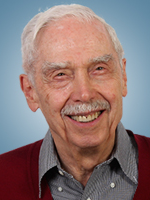Go to
August 30, 2017
System-Level Noise Filtering and Linearization Scheme
Wednesday, 30 August 2017 at 17:15 in room ELA 1
Gabor C. Temes, School of EECS, Oregon State University, Corvallis, Oregon, USA
Abstract:
The performance of analog integrated circuits is limited by the noise generated in its components. Some of this noise (thermal and shot noises) have a white spectrum, while others (dc offset, 1/f noise) are restricted to a narrow frequency range near dc. Several circuit techniques (correlated double sampling, chopping) exist for mitigating the effects of the low-frequency noise components. In this lecture, a different design approach is described for suppressing low-frequency noise. Unlike earlier techniques, the proposed process also reduces even-order distortion, which is another major limitation of analog circuits. It therefore may allow the use of single-ended circuits in some applications where usually differential structures are needed. For a specified performance, this may allow a significant reduction, as much as 40 - 50 %, in complexity and power dissipation compared to the equivalent differential implementation.
About the Speaker:
 The for more than three decades, the research of Dr. Gabor C. Temes into analog signal processing has had a profound and broad impact on the quality of sound and data communications.
The for more than three decades, the research of Dr. Gabor C. Temes into analog signal processing has had a profound and broad impact on the quality of sound and data communications.
His research in analog and digital signal processing and mixed-signal integrated electronics has been prolific, progressing from classical network theory to active filter synthesis to monolithic filter and data converter design. Without his work on analog-to-digital converters, DSL or cable-modem Internet connections would be much slower than they now are, and the data density of hard disk drives would also be lower than that in today’s systems.
As professor of engineering at Oregon State University in Corvallis, Dr. Temes has been a leading authority on delta sigma data converters. His research on filter design, optimization methods and low-sensitivity filter structures helped significantly the explosive growth of analog signal processing in MOS integrated circuit technologies during the last 30 years. His work in switched capacitor filters helped define communications chips in the 1980s by conceiving fundamental design methods for them.
As an educator, Dr. Temes has been responsible for several seminal texts on analog signal processing and has co-authored several widely used reference books, including "Introduction to Circuit Synthesis and Design," "Modern Filter Theory and Design," "Oversampling Delta Converters" and "Delta-Sigma Data Converters." He has published over 600 papers and conference proceedings, including a paper on switched capacitor circuit design considered to be the most complete summary of switched-capacitor filter design methods. He holds 14 patents on novel circuits and devices and also has organized hundreds of global short courses on signal processing topics.
An IEEE Life Fellow, Gabor Temes received the CAS Darlington Award, and the CAS Education as well as Technical Achievement Awards. He won the 1998 IEEE Graduate Teaching Award, the 2006 IEEE Gustav Robert Kirchhoff Award, and the 2009 CAS Mac Van Valkenburg Award. He is the 2017 recipient of the Semiconductor Industry Association University Researcher Award. He is a member of the U.S. National Academy of Engineering. He served as Editor of IEEE TCAS-I.
Dr. Temes holds degrees from the Technical University of Budapest in engineering and Eotvos Lorand University in Budapest in physics, as well as a doctoral degree in electrical engineering from the University of Ottawa in Canada.
Secondary navigation
- January 29, 2018
- August 30, 2017
- Past seminars
- 2016 - 2017 Seminars
- 2015 - 2016 Seminars
- 2014 - 2015 Seminars
- 2013 - 2014 Seminars
- 2012 - 2013 Seminars
- 2011 - 2012 Seminars
- 2010 - 2011 Seminars
- 2009 - 2010 Seminars
- 2008 - 2009 Seminars
- 2007 - 2008 Seminars
- 2006 - 2007 Seminars
- August 31, 2007
- June 29, 2007
- June 20, 2007
- June 5, 2007
- May 30, 2007
- May 16, 2007
- May 15, 2007
- April 24, 2007
- March 27, 2007
- March 14, 2007
- February 9, 2007
- February 8, 2007
- January 12, 2007
- December 5, 2006
- November 14, 2006
- October 31, 2006
- October 27, 2006
- October 26, 2006
- October 20, 2006
- September 20, 2006
- September 20, 2006
- September 20, 2006
- September 19, 2006
- 2005 - 2006 Seminars
- August 23, 2006
- August 22, 2006
- June 26, 2006
- June 20, 2006
- June 16, 2006
- June 7, 2006
- June 6, 2006
- May 30, 2006
- May 17, 2006
- May 10, 2006
- April 27, 2006
- April 12, 2006
- March 31, 2006
- March 29, 2006
- March 22, 2006
- March 15, 2006
- February 27, 2006
- February 8, 2006
- January 25, 2006
- January 19, 2006
- January 18, 2006
- January 17, 2006
- January 11, 2006
- November 30, 2005
- November 23, 2005
- November 2, 2005
- October 26, 2005
- October 25, 2005
- October 5, 2005
- September 28, 2005
- 2005 Seminars

